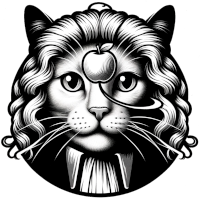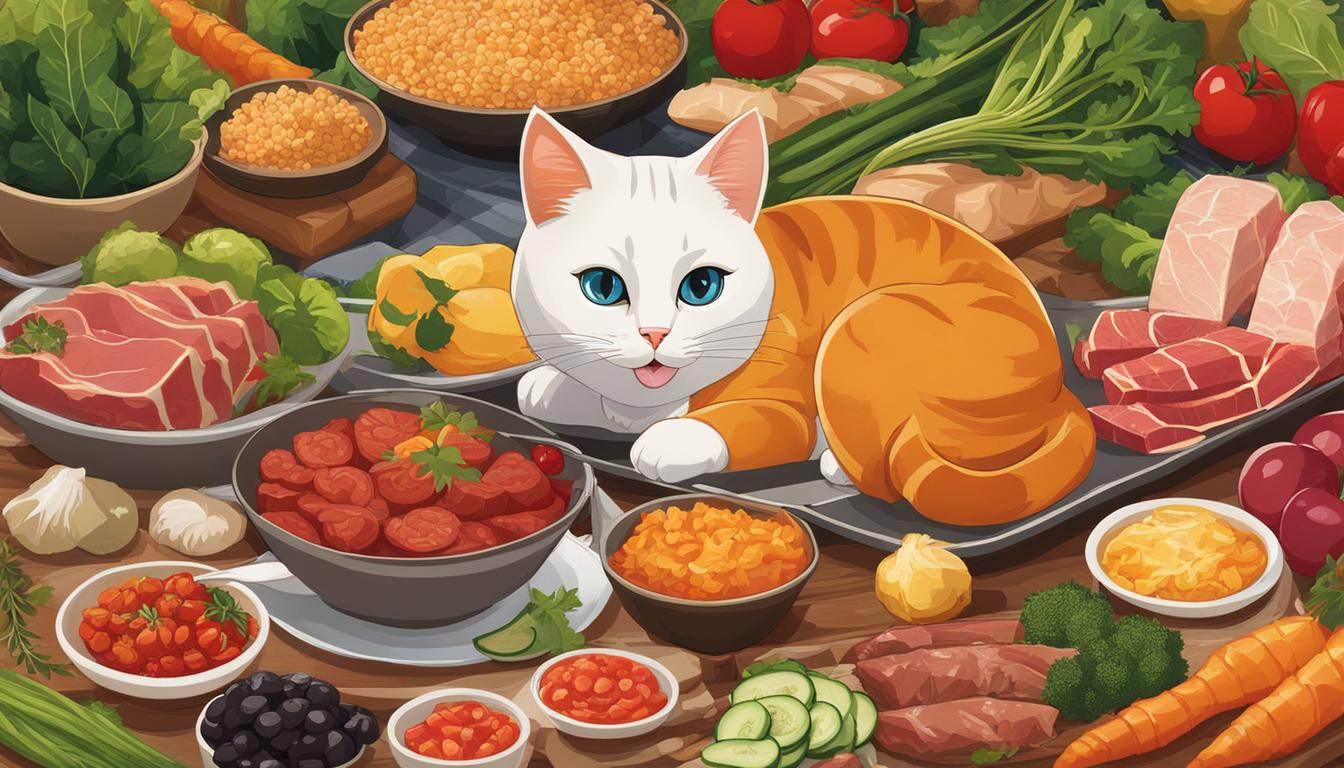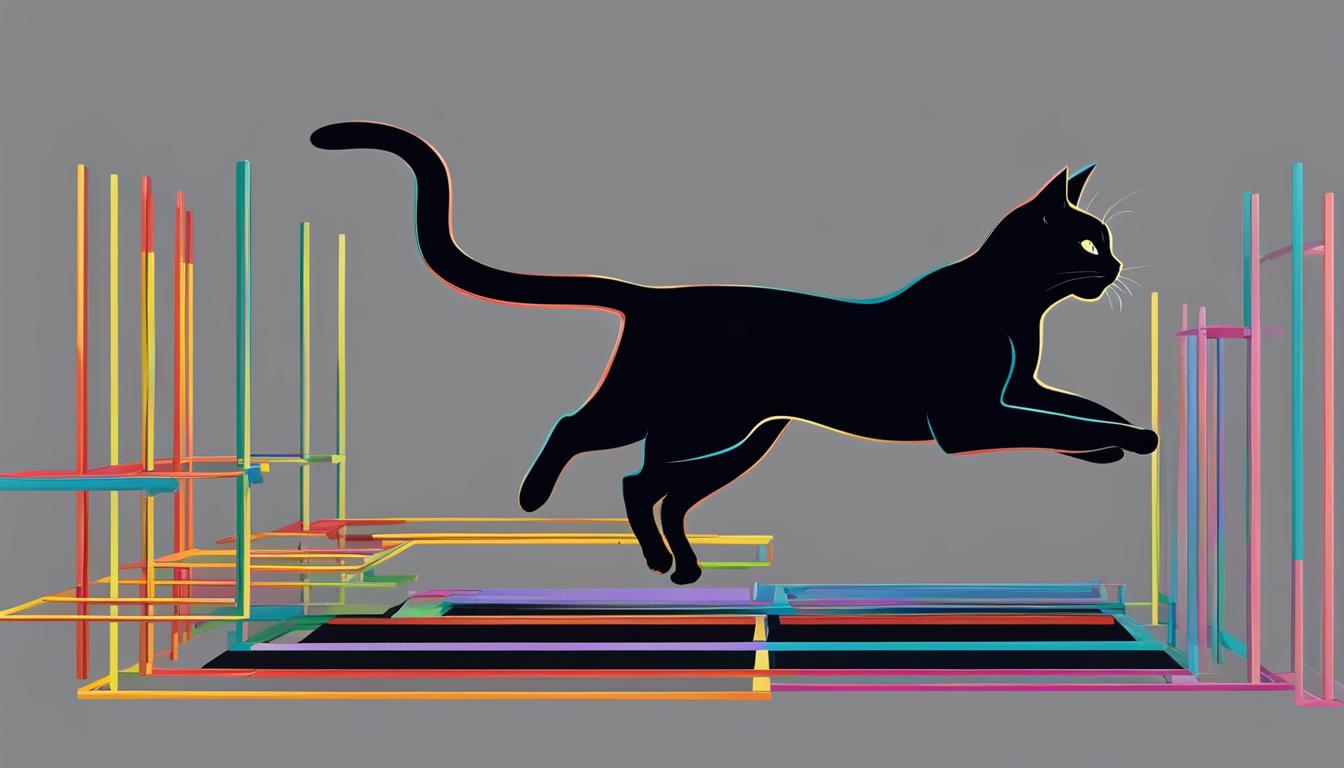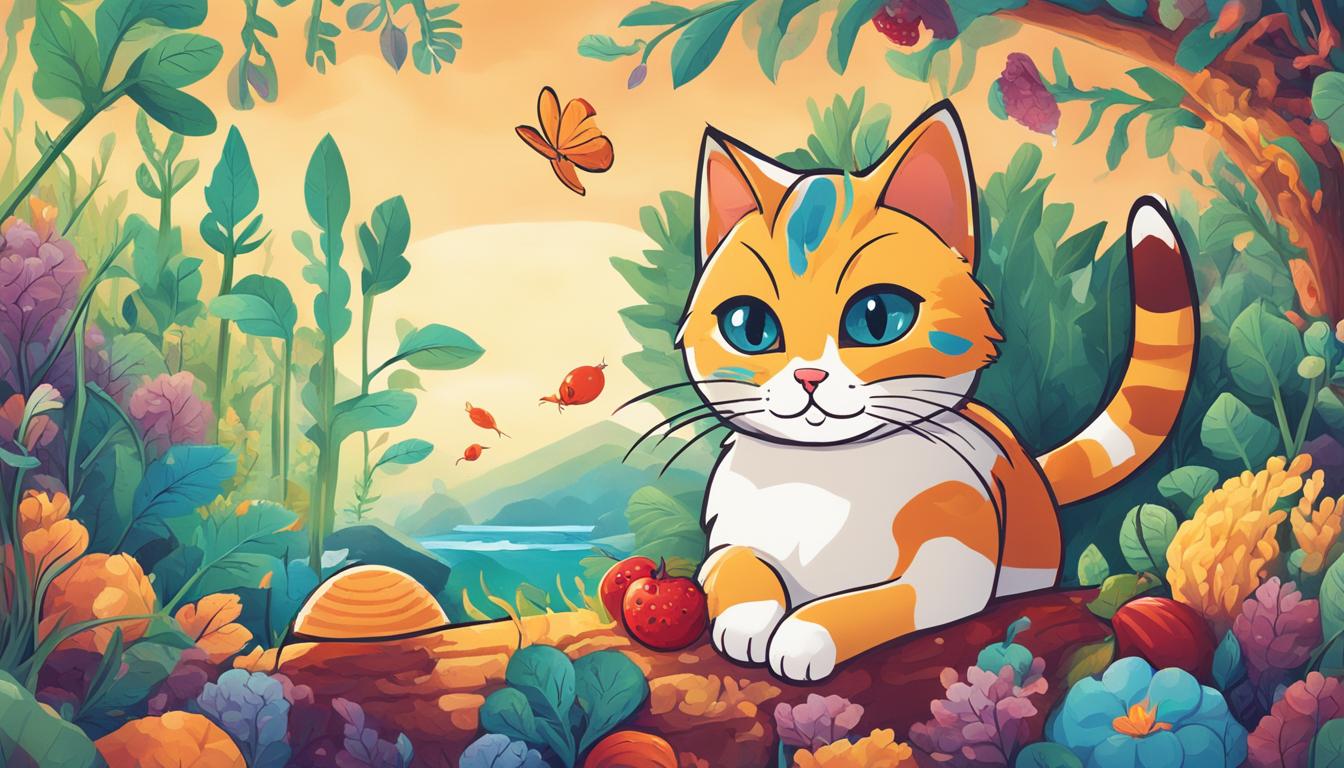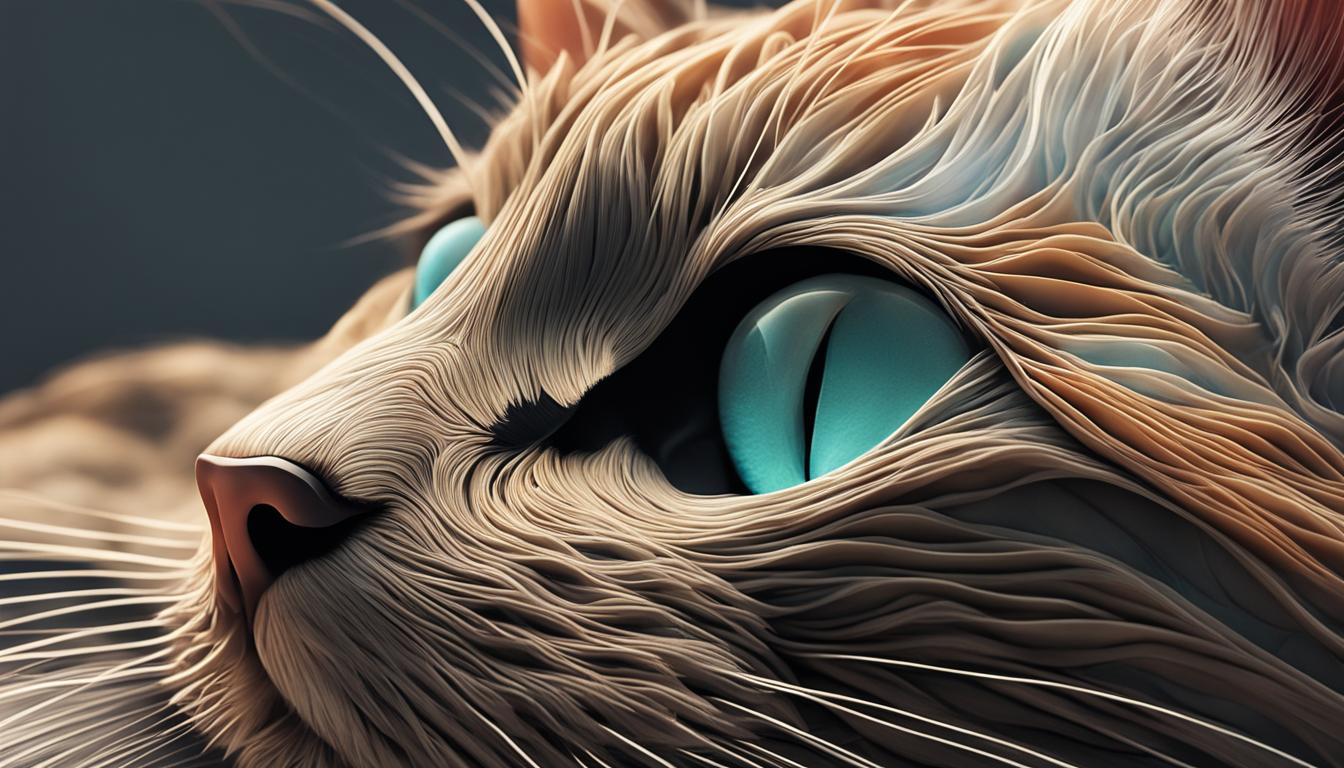Hey there, fellow cat lovers! Today, I want to dive into the fascinating world of feline nutrition and uncover what your furry friend needs for optimal health. Just like us humans, cats require a balanced diet to thrive and stay healthy. But what exactly does that entail? Let’s find out!
When it comes to feeding your cat, it’s essential to provide them with the right nutrients to support their overall well-being. From playful kittens to wise seniors, each life stage requires specific nutritional requirements. And as devoted cat parents, we want the best for our precious feline companions.
Key Takeaways:
- Feline nutrition essentials are crucial for your cat’s well-being and overall health.
- Providing a balanced diet is the key to ensuring your cat thrives at every life stage.
- Understanding your cat’s nutritional requirements is vital for making informed choices.
- Consulting with a veterinarian can help you determine the best diet for your cat’s individual needs.
- A cat nutritional requirements chart can be a useful tool in planning your cat’s meals.
Feeding Your Kitten: Nutritional Needs and Guidelines
Feeding your kitten is a crucial aspect of ensuring their optimal health and growth. As a responsible cat owner, it is important to understand the nutritional needs and guidelines for feeding your young feline friend. Providing the right nourishment from an early age sets the foundation for a healthy and happy life.
When it comes to choosing kitten food, there are various options available in the market. Commercial kitten food is specifically formulated to meet the dietary requirements of growing cats. It is enriched with essential nutrients, vitamins, and minerals necessary for their development. Look for high-quality brands that prioritize real meat as the main ingredient, avoiding fillers and artificial additives.
Alternatively, you may consider preparing homemade cat food recipes to ensure complete control over the ingredients. When opting for homemade meals, it is crucial to consult with a veterinarian or feline nutritionist to ensure the recipes provide all the necessary nutrients. A balanced homemade diet should include a combination of lean protein, carbohydrates, and healthy fats to support your kitten’s growth.
In addition to choosing the right food, establishing a feeding schedule is vital for your kitten’s overall well-being. Unlike adult cats, kittens require multiple small meals throughout the day. Aim for four to six feeding sessions, evenly spaced apart. This allows their bodies to absorb nutrients efficiently and prevents overeating. As your kitten grows, you can gradually transition to a more structured feeding routine, aligning with the recommended guidelines for different cat ages.
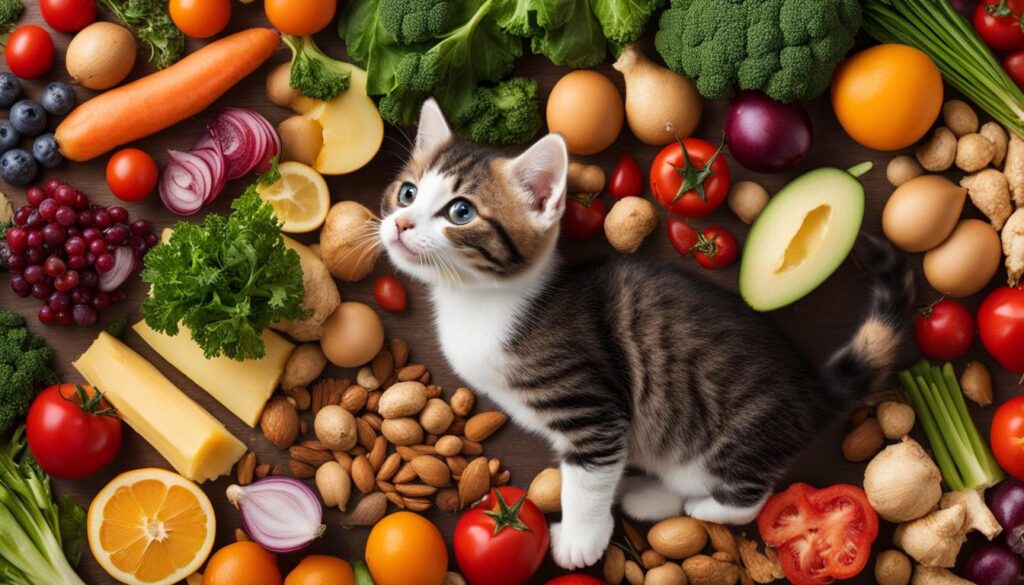
Kitten Feeding Schedule
| Age | Feedings per Day | Portion Size per Meal |
|---|---|---|
| 6-8 weeks | 4-5 | 1/4 to 1/3 cup of wet food or 1/4 to 1/3 cup of dry food |
| 8-12 weeks | 3-4 | 1/3 to 1/2 cup of wet food or 1/4 to 1/3 cup of dry food |
| 3-6 months | 3 | 1/2 to 3/4 cup of wet food or 1/4 to 1/3 cup of dry food |
Remember, every kitten is unique, and their nutritional needs may vary. It is important to monitor their growth, consult with a veterinarian, and make necessary adjustments to their diet accordingly. By providing the right nutrition and following feeding guidelines, you are setting your kitten up for a healthy and happy life.
Choosing the Right Cat Food: Pros and Cons of Different Types
When it comes to choosing the right cat food, there are a wide variety of options available on the market. Understanding the pros and cons of different types of cat food can help you make an informed decision that suits your feline companion’s nutritional needs.
Commercial Cat Food
Commercial cat food is the most common choice for cat owners due to its convenience and wide availability. It comes in various forms, including dry kibble and wet canned food. One of the advantages of commercial cat food is that it is formulated to meet the nutritional requirements of cats at different life stages. Additionally, commercial cat food often undergoes rigorous testing to ensure it meets quality and safety standards.
However, it is important to be aware of the potential drawbacks of commercial cat food. Some brands may contain fillers, artificial preservatives, and low-quality ingredients. It’s essential to read the product labels and choose a reputable brand that prioritizes high-quality ingredients and avoids unnecessary additives.
Natural Cat Food
Natural cat food has gained popularity among cat owners seeking a more wholesome and minimally processed option. This type of cat food typically contains high-quality ingredients and avoids artificial additives. Natural cat food may come in both dry and wet forms, offering a variety of options to suit your cat’s preferences.
One of the key advantages of natural cat food is the emphasis on real meat as the primary source of protein. This aligns with a cat’s natural diet as obligate carnivores. Natural cat food may also be free from common allergens, making it a suitable choice for cats with food sensitivities.
Allergy-Friendly Cat Food Options
For cats with specific food allergies or sensitivities, there are specialized cat food options available. These allergy-friendly cat foods are formulated to exclude common allergens such as grains, dairy, and certain proteins. They are designed to provide a balanced and complete diet while minimizing the risk of triggering allergic reactions.
It’s important to consult with your veterinarian if you suspect your cat has food allergies or sensitivities. They can recommend appropriate allergy-friendly cat food options and guide you in finding the best diet for your feline friend.
| Type of Cat Food | Pros | Cons |
|---|---|---|
| Commercial Cat Food | Convenient, formulated for different life stages, undergoes testing | Potential for fillers and low-quality ingredients |
| Natural Cat Food | Wholesome, minimally processed, high-quality ingredients | May have a higher price point |
| Allergy-Friendly Cat Food | Excludes common allergens, suitable for cats with food sensitivities | May have a limited variety of flavors/textures |
Nutrition for Senior Cats: Special Considerations
As cats age, their nutritional needs change, and it is crucial to provide them with a diet that supports their health and well-being. One of the key considerations for senior cats is weight management. Many older cats tend to become less active and may experience a decrease in their metabolism, which can lead to weight gain. To prevent obesity and related health issues, it is important to adjust their diet accordingly.
Senior cats also require adequate hydration to support their kidney function and maintain overall health. Dehydration can be a common problem in older cats, as they may have a decreased thirst drive. One way to encourage hydration is by incorporating wet food into their diet, as it provides additional moisture. Additionally, offering multiple water sources throughout the house and adding water fountains can help entice them to drink more.
Table:
| Nutritional Considerations for Senior Cats | Recommended Actions |
|---|---|
| Weight Management | Consult with a veterinarian to determine the appropriate calorie intake for your senior cat. Consider a specialized senior cat food formula that is lower in calories and higher in protein. |
| Hydration | Ensure your senior cat has access to fresh water at all times. Incorporate wet food into their diet or consider adding water to their dry food. Consider using water fountains to encourage drinking. |
| Digestive Health | Choose a senior cat food formula that contains easily digestible ingredients and is gentle on the digestive system. Additionally, consider adding probiotics or digestive enzymes to their diet to support gut health. |
| Joint Health | Look for senior cat food formulas that contain added glucosamine and chondroitin to support joint health and mobility. |
In summary, providing proper nutrition for senior cats requires careful consideration of their changing needs. Weight management and hydration are key factors to address, and incorporating senior cat food formulas designed specifically for their unique requirements can help support their overall health and longevity.
Understanding Feline Nutritional Requirements
When it comes to keeping your cat healthy and happy, understanding their nutritional requirements is essential. Providing your furry friend with the right balance of essential vitamins and minerals can support their overall well-being and help prevent health issues down the line. Here, we’ll explore the key nutrients that cats need and how dietary supplements can play a role in meeting their nutritional needs.
The Essential Vitamins for Cats
Cats require a range of vitamins to support their growth, development, and immune function. Vitamin A is vital for maintaining healthy vision and a strong immune system. It can be found in animal-based foods such as liver and fish. Vitamin D helps regulate calcium and phosphorus levels, ensuring healthy bones and teeth. Your cat can naturally produce vitamin D through exposure to sunlight, but it can also be found in fatty fish and cod liver oil.
Vitamin E acts as an antioxidant, protecting cells from oxidative damage. It can be found in vegetable oils, nuts, and seeds. B vitamins, including thiamine, niacin, and riboflavin, play a crucial role in energy metabolism and maintaining a healthy nervous system. These vitamins are typically found in meat, fish, and whole grains.
Supplementing Your Cat’s Diet
While a well-balanced diet can provide most of the essential vitamins and minerals your cat needs, dietary supplements can offer additional support. However, it’s important to consult with your veterinarian before introducing any supplements into your cat’s routine. They can assess your cat’s specific needs and recommend the most appropriate supplements based on their age, health condition, and diet.
Some common dietary supplements for cats include omega-3 fatty acids, probiotics, and joint support supplements. Omega-3 fatty acids, found in fish oil, can help improve coat health, reduce inflammation, and support brain function. Probiotics aid in maintaining a healthy digestive system, while joint support supplements can benefit older cats with arthritis or joint issues.
| Vitamin | Function | Food Sources |
|---|---|---|
| Vitamin A | Supports vision and immune system | Liver, fish |
| Vitamin D | Regulates calcium and phosphorus levels | Fatty fish, cod liver oil |
| Vitamin E | Acts as an antioxidant | Vegetable oils, nuts, seeds |
| B Vitamins | Aids in energy metabolism and nervous system health | Meat, fish, whole grains |
Understanding your cat’s nutritional requirements is key to providing them with a healthy and balanced diet. Whether through a well-rounded meal plan or the addition of dietary supplements, meeting their essential vitamin needs is crucial for their overall well-being. Consult with your veterinarian to ensure your cat’s specific needs are being met and enjoy watching your feline friend thrive.
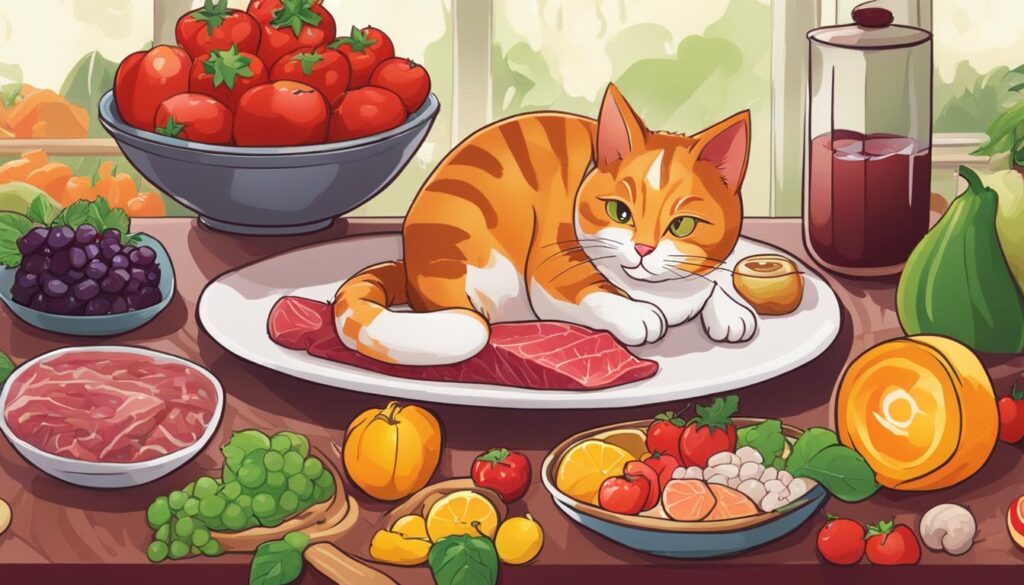
Conclusion
As I conclude my exploration of feline nutrition, it’s clear that providing your cat with the best diet is crucial for their overall health and wellbeing. By understanding their nutritional requirements and making informed choices, you can ensure that your furry friend is on the right track.
A cat nutritional requirements chart is a handy tool that can guide you in selecting the right balance of nutrients for your feline companion. It outlines the essential vitamins, minerals, and macronutrients that cats need to thrive. With this information, you can choose cat food that meets their specific dietary needs.
Hydration is another vital aspect of feline nutrition. Cats are notoriously bad at drinking enough water, so it’s essential to encourage them to stay hydrated. Consider providing a water fountain or adding wet food to their diet, as it contains a higher moisture content, aiding in their hydration levels.
In summary, the best diet for healthy cats is one that takes their nutritional requirements into account. Consult the cat nutritional requirements chart, choose the right cat food for their life stage, and promote proper hydration. By doing so, you’ll help your beloved feline friend lead a long and vibrant life.
FAQ
What are the essential feline nutrition requirements?
Cats require a balanced diet that includes quality proteins, fats, carbohydrates, vitamins, and minerals. Additionally, they need access to fresh water at all times.
What is the best diet for healthy cats?
The best diet for a healthy cat is a well-balanced commercial cat food that meets their nutritional needs. It should be formulated specifically for their life stage (kitten, adult, or senior) and take into consideration any specific health conditions they may have.
Can I feed my cat homemade food?
Homemade cat food can be an option, but it requires careful planning to ensure it meets all the necessary nutritional requirements. It is advisable to consult with a veterinarian or a veterinary nutritionist to create a balanced and safe homemade diet for your cat.
What is the feeding schedule for kittens?
Kittens need to be fed more frequently than adult cats. They typically require four to five small meals a day until they are about six months old. After that, they can transition to a regular feeding schedule of twice a day.
What are the pros and cons of different types of cat food?
Commercial cat food offers convenience and a wide variety of options tailored to specific needs, but some may contain fillers and artificial ingredients. Natural cat food options may be healthier, but they can be more expensive and have a shorter shelf life.
Are there allergy-friendly cat food options?
Yes, there are hypoallergenic cat food options available that are formulated to minimize the risk of allergic reactions. These typically contain novel protein sources and limited ingredients to reduce the chances of triggering allergies in cats.
What are the special considerations for senior cat nutrition?
Senior cats may have specific dietary needs, such as lower calorie content to prevent weight gain and joint-supporting ingredients to ease arthritis. It is important to monitor their body condition and consult with a veterinarian for appropriate nutritional adjustments.
What are the essential vitamins for cats?
Cats require various vitamins, including vitamin A, vitamin D, vitamin E, vitamin K, and the B vitamins. These vitamins play essential roles in maintaining their overall health and well-being.
Can I give dietary supplements to my cat?
In some cases, dietary supplements may be beneficial for cats, especially if they have certain health conditions or deficiencies. However, it is important to consult with a veterinarian before giving any supplements to ensure they are safe and appropriate for your cat.
